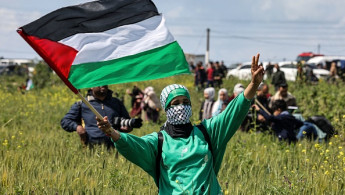Palestinians in Gaza mark Land Day as Israel expands settlement in occupied West Bank
Palestinians throughout the territory of historical Palestine commemorated the 47th anniversary of Palestine Land Day on Thursday amidst Israel's expansion of illegal settlements activities in the occupied West Bank.
On 30 March 1976, Israel confiscated about 21,000 dunums of land from a number of Palestinian villages in the Galilee, including Arraba, Sakhnin, Deir Hanna, Arab al-Sawaed and others to establish more settlements within the scope of the plan to Judaize the Galilee and empty it of its native Palestinian population.
As a result, the Palestinian communities in the Israeli-occupied Palestinian lands of 1948 years launched general protests to confront the Israeli policies of confiscation, uprooting, and Judaisation.
The Israeli armed forces fired live bullets toward protestors and killed at least six Palestinians and wounded 49 others, while it arrested about 300 people who participated in the mass protests and defended their lands.
Since then, the Palestinians declared 30 March as "Palestine Land Day" to mark the Israeli crimes against the Palestinians and their lands, properties and their existence.
According to the data of the Higher Follow-up Committee, the supreme leadership body for the Palestinians of 48, Israel seized about one and a half million dunams since its occupation of Palestine until 1976, and only about half a million dunums remained in their possession, in addition to millions of dunams of refugee property and public common lands.
To mark this year's anniversary, dozens of Palestinians participated in a popular protest held by the Palestinian factions in the Gaza Strip in the "Al-Awda" camp on the outskirts of the eastern Gaza Strip, near the separation fence with Israel.
The participants raised Palestinian flags and banners with phrases calling for not abandoning the land and urging its liberation from the Israeli occupation. Meanwhile, an artistic group dressed in traditional Palestinian costumes performed folk dances for the crowd.
Khalid al-Batsh, a senior leader in the Palestinian Islamic Jihad, said to The New Arab that "the anniversary of our land came while the Israeli occupation escalate its crimes against our lands in the occupied West Bank in favour of the settlement activities."
"The occupation's perseverance in adopting a law allowing the storming of homes without prior permission means violating the sanctity of our people at home," he said, further warning of Israeli attempts to write off historical Arab cities and completely Judaise them.
During the protest, tens of Gazans went to the separating fence to throw stones at the Israeli army forces stationed in the territory. In turn, the Israeli army fired tear gas canisters at the protestors, suffocating several protesters.
"I came here to tell the world and the Israeli occupation that we are the owners of the land and we will keep our resistance to defend our rights and return our historical cities," Reziq Shamalakh, a protestor, said to TNA.
While he was raising a big Palestinian flag, the young man said, "Israel does not know any peaceful negotiations. It only knows the language of force and hatred against the Palestinians."
In the occupied West Bank, a mass protest is scheduled for Friday against the Israeli forces in critical sites that have been witnessing weekly clashes between the Palestinians and the Israeli army.
At the end of 2022, the Palestinian population reach about 14.3 million, of whom 5.4 million reside in the State of Palestine, and about 1.7 million Palestinians in the 1948 lands, while the number of Palestinians in Arab countries reached about 6.4 million Palestinians, and about 761,000 in foreign countries, according to the Palestinian Central Bearue of Statistics.
Meanwhile, the number of Jews in historic Palestine reached 7.1 million. Thus, the number of Palestinians and Jews in historical Palestine was equal in number by the end of the year 2022, at 7.1 million each.
The Israeli occupation exploits more than 85 per cent of the total land area in historical Palestine, knowing that the Jews during the British Mandate era and until 1947 exploited only 1,682 square kilometres, which constituted 6.2 per cent of the land of historical Palestine.
From 1967 until the end of 2017, more than 200 settlements were established in the occupied West Bank (excluding occupied East Jerusalem), inhabited by about 620,000 Israeli citizens, according to the Israeli Information Center for Human Rights in the Occupied Territories, B'Tselem.
Since the Oslo Accords in 1993, the settlement file has been absent from the table of any Palestinian-Israeli meeting, the last of which was the Aqaba meeting held in Jordan in February, and Sharm al-Sheikh held in Egypt in early March, according to what Palestinian officials and political analysts.
Hanan Ashrawi said to the Al-Arabi Al-Jadeed, TNA's Arabic-language sister publication, that "the current Palestinian leadership has given up all sources of power, and we are the ones asking to talk to the occupation."
"There is a major defect that is difficult to fix today with regard to the settlement file," she added. "Unfortunately, the Palestinian leadership believes that the conversation with the Israeli occupation is a gain and that such meetings create a political horizon."
She further stated her scepticism that the Palestinian leadership can create any political horizon without being in harmony with the requirements of peace on the ground, such as stopping Israel's illegal settlements.





 Follow the Middle East's top stories in English at The New Arab on Google News
Follow the Middle East's top stories in English at The New Arab on Google News


